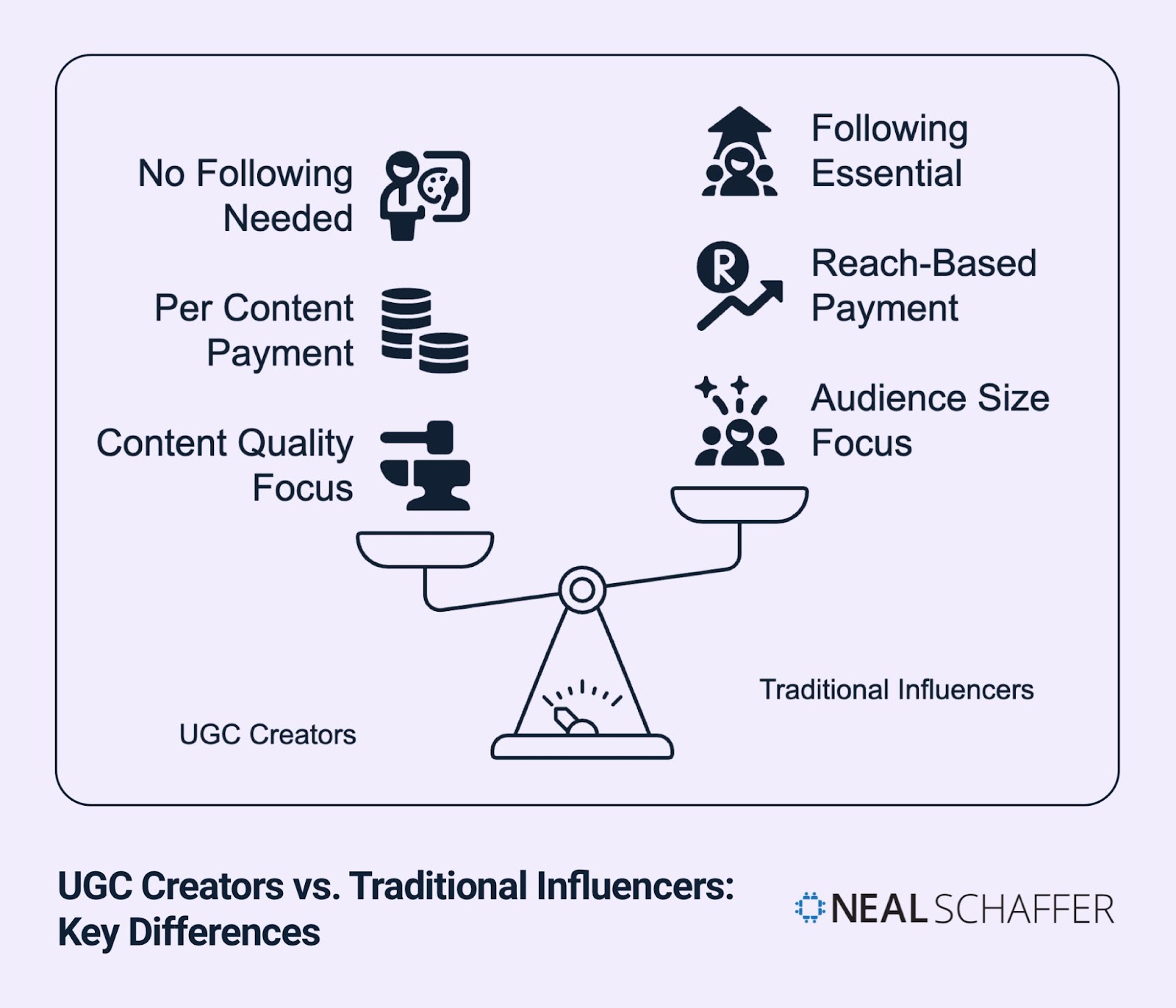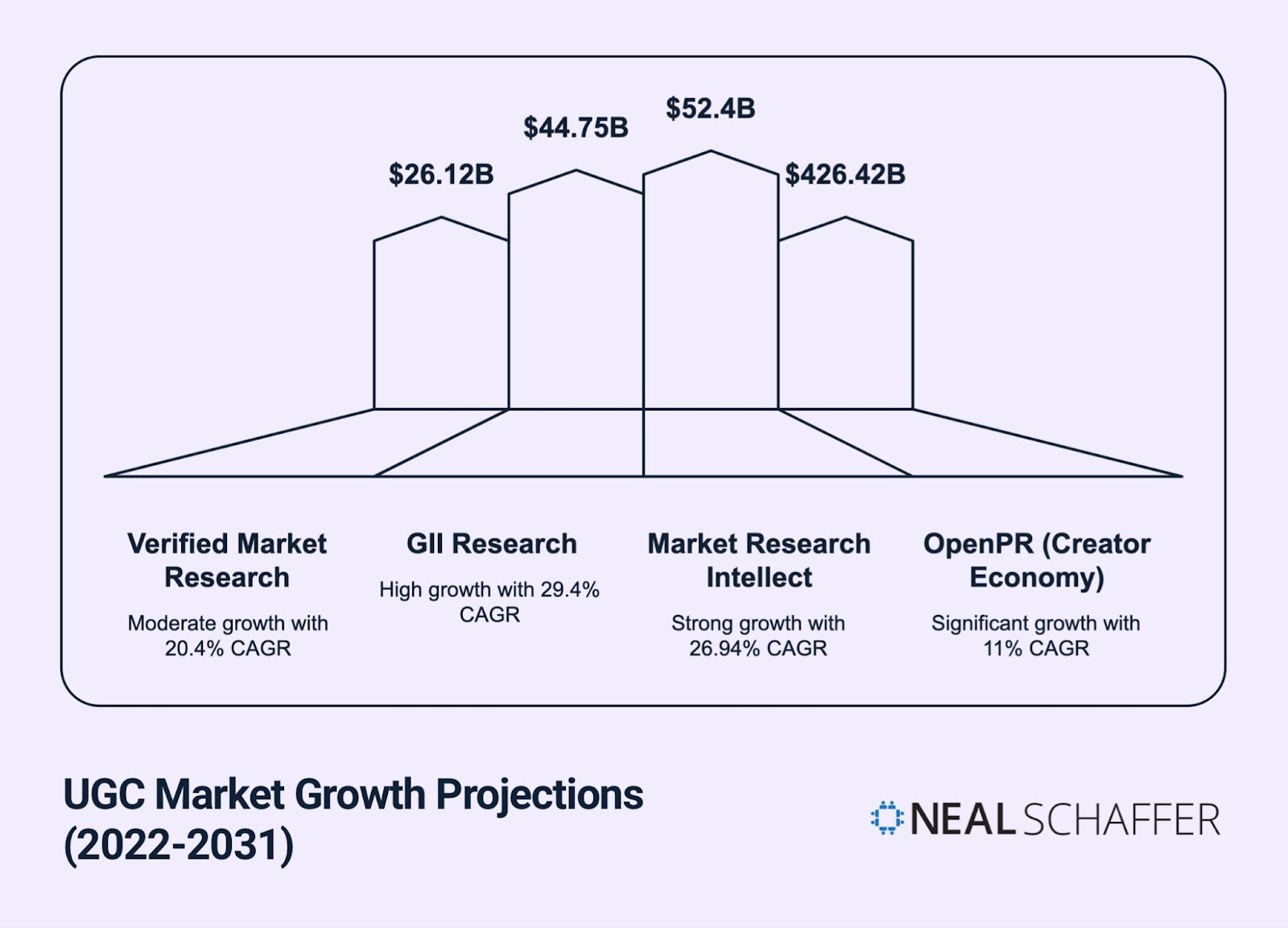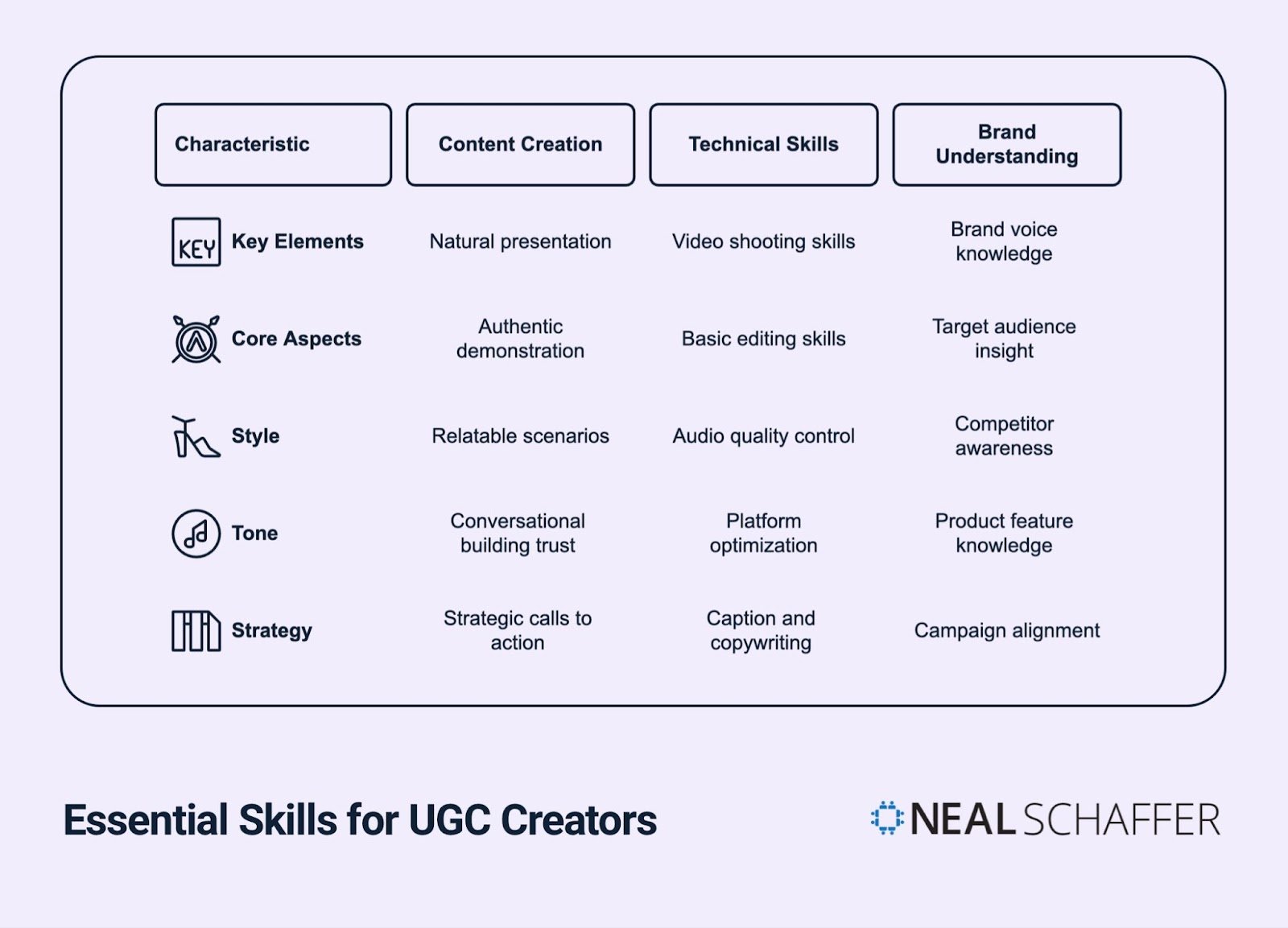The creator economy has opened remarkable opportunities for people who love making content. One area showing particular promise is UGC creation. The authentic voice of regular people using products has become marketing gold for brands.
As someone who has worked with dozens of clients and spoken at hundreds of events, I’ve witnessed firsthand how user-generated content transforms marketing results. The genuine nature of UGC connects with audiences in ways polished advertisements simply cannot, as I wrote about at length in Digital Threads.
This guide will show you exactly how to become a successful UGC creator. You’ll discover the essential skills, portfolio-building strategies, and methods for finding paid opportunities. Let’s start by understanding what UGC creation actually involves.
What is a UGC Creator?
UGC creators produce authentic content featuring products or services without necessarily being the face of the brand. They create content that looks and feels natural – like it was made by a real customer rather than a marketing team.
Think about how you trust recommendations from friends more than advertisements. UGC taps into that same psychology but at scale. The content typically showcases products in everyday settings, highlighting benefits through real-world usage.

Many people confuse UGC creators with influencers. The distinction matters for your career path. Let’s clarify the key differences between these roles:
| Aspect | UGC Creator | Traditional Influencer |
|---|---|---|
| Primary Focus | Content quality and authenticity | Audience size and engagement |
| Payment Basis | Per content piece created | Reach and impression potential |
| Following Requirement | Not necessary for success | Essential to career viability |
| Content Usage | Brand owns for multiple channels | Typically posted on influencer’s accounts |
| Creative Control | Balance of brand guidelines and creator style | Greater personal creative freedom |
This distinction is important because it shapes your strategy. As a UGC creator, you can succeed without building a large personal following first. Your focus stays on creating authentic, high-quality content that brands can use across their marketing channels.
The Growing UGC Creator Market Opportunity
The UGC creator economy is expanding rapidly, creating significant opportunities for both new and established creators. This growth comes from brands increasingly recognizing UGC’s effectiveness and consumers’ clear preference for authentic content.

Market research confirms this isn’t just a passing trend. Multiple independent analyses show substantial growth projections for the UGC sector:
| Research Source | Starting Value | Projected Value | CAGR |
|---|---|---|---|
| Verified Market Research | $5.4 billion (2023) | $26.12 billion (2031) | 20.4% |
| GII Research | $4.4 billion (2022) | $44.75 billion (2031) | 29.4% |
| Market Research Intellect | $6.2 billion (2023) | $52.4 billion (2031) | 26.94% |
| OpenPR (Creator Economy) | Not specified | $426.42 billion (2030) | 11% |
These impressive growth projections tell us something important: now is an excellent time to develop UGC creation skills. The market is expanding, not contracting, creating space for new creators to establish themselves.
Creator marketing investment is rising, with the UGC platforms market expected to reach $426.42 billion by 2030 with an 11% CAGR.
Why are brands investing so heavily in UGC? The answer lies in its unique benefits:
- Authenticity that builds trust – Consumers increasingly distrust traditional advertising
- Higher engagement rates – UGC typically outperforms brand-created content
- Cost-effectiveness – Professional production often costs significantly more
- Diverse perspectives – Different creators can reach various audience segments
- Platform-native content – UGC feels natural in social feeds, reducing disruption
This clear market opportunity sets the stage for growing demand. Now, let’s look at the skills you need to succeed in this expanding field.
Essential Skills for Successful UGC Creators
Success as a UGC creator requires developing specific capabilities. The most valuable creators master both technical and soft skills that help them create content brands can actually use.
Let’s break down the essential skill groups that will help you stand out in this competitive field. Each contributes differently to your overall effectiveness and marketability.
Content Creation Fundamentals
Great UGC balances creativity with strategic marketing understanding. It tells a compelling product story while feeling natural and unscripted. This balance takes practice to perfect.
The best UGC typically includes these key elements:
- Clear product visibility without feeling forced or unnatural
- Authentic demonstration of how the product solves real problems
- Relatable scenarios that match how target customers would actually use the product
- Natural, conversational tone that builds trust with viewers
- Strategic calls to action that feel helpful rather than pushy
These fundamentals form the foundation of effective UGC. They create content that feels authentic while still serving marketing objectives.
Technical Skills You Need
The practical side of content creation requires specific technical abilities. These skills ensure your work meets professional standards and performs well on social platforms.

Essential technical skills include:
Is Your LinkedIn Not Delivering Results?
Just released: my new book to help professionals, entrepreneurs, and business owners maximize LinkedIn for real growth.
With years of LinkedIn expertise, Maximizing LinkedIn for Business Growth offers actionable steps to build your brand, expand your network, and drive results.
Start leveraging LinkedIn like never before—grab your copy now! Click the cover or button below to buy on Amazon.
- Video shooting fundamentals – Understanding framing, lighting, and composition
- Basic editing – Cutting clips, adding music, and creating smooth transitions
- Audio quality management – Recording clear voice-overs and managing background noise
- Platform-specific optimization – Creating content in the right formats and dimensions
- Caption and copy writing – Crafting compelling text that complements visual content
The good news? You can develop these skills through practice and don’t need expensive formal education. Many successful UGC creators are self-taught through online resources and consistent practice.
Understanding Brand Expectations
Working effectively with brands requires understanding their expectations and marketing objectives. Each brand has specific goals, guidelines, and audience considerations for their UGC.
Key aspects you need to understand include:
- Brand voice and communication style – How the brand speaks to its audience
- Target audience demographics – Who the brand wants to reach
- Competitor positioning – How the brand differentiates from alternatives
- Key product features – What aspects need highlighting
- Campaign objectives – What specific goals the content should achieve
This understanding helps you create content that aligns with brand needs while maintaining the authenticity that makes UGC valuable. With these essential skills in place, you’re ready to build a portfolio that showcases your abilities.
Building Your UGC Portfolio
A strong portfolio is your most important asset as a UGC creator. Brands need to see examples of your work before hiring you, even if you’re just starting out.
The good news is you don’t need to wait for paid opportunities to build your portfolio. Let’s explore how to create effective showcase pieces from scratch.
Creating Your First UGC Samples
You can begin building your portfolio using products you already own and love. These spec pieces (unpaid samples) demonstrate your capabilities to potential clients.
Follow these steps to create effective portfolio samples:
- Select products you genuinely use and enjoy
- Research how the brand currently markets these products
- Identify unique angles that showcase product benefits
- Create 3-5 content pieces in different styles
- Edit your work to professional standards
Quality matters more than quantity when starting out. Five excellent samples will serve you better than fifteen mediocre ones. Focus on demonstrating versatility and professional quality in your initial portfolio.
Platforms for Showcasing Your Work
Once you’ve created sample content, you need a professional way to showcase it to potential clients. Several platforms work well for UGC creators at different stages of their journey:
| Platform | Best For | Key Features | Cost |
|---|---|---|---|
| Instagram Business Account | Visual content showcase | High visibility, contact button, insights | Free |
| Personal Website | Professional presentation | Full control, detailed portfolio organization | $10-30/month |
| B2B clients and corporate brands | Professional networking, work history | Free | |
| TikTok Creator Profile | Short-form video content | Algorithm reach, trending engagement | Free |
Many successful creators maintain profiles on multiple platforms to maximize visibility. Each platform reaches different potential clients and showcases different aspects of your capabilities.
Developing a Consistent Style
While versatility matters, developing a recognizable style helps you stand out from competitors. Your unique approach becomes your creative signature, making your work immediately identifiable.
Consider these elements when defining your personal style:
- Visual aesthetics (lighting, color grading, composition)
- Editing pace and transitions
- Voice and tone in narration or text
- Storytelling approaches you excel at
- Musical and sound design preferences
Your style should reflect your creative strengths while remaining adaptable to different brand needs. This balance makes you distinctive yet versatile enough for various opportunities.
Finding UGC Opportunities
Securing consistent UGC work requires understanding where opportunities exist and how to position yourself effectively. Multiple pathways can lead to paid projects.
Let’s explore the primary channels for finding UGC work, starting with dedicated platforms that connect creators with brands.
UGC Platforms and Marketplaces
Specialized platforms connect UGC creators with brands seeking content. These marketplaces streamline the process of finding and securing projects.
| Platform | Commission/Fee | Project Types | Creator Requirements |
|---|---|---|---|
| Billo | 0-25% | Product review videos, testimonials | Application approval |
| Upwork | 5-20% | Various content creation projects | Open to all |
| Fiverr | 20% | Package-based UGC services | Open to all |
| Insense | Varies | Brand-specific campaigns | Portfolio review |
Each platform offers different advantages and requirements. Many creators maintain profiles on multiple platforms to maximize their opportunities while learning which environment works best for their style and offerings.
Direct Outreach Strategies
While platforms provide structured ways to find work, direct outreach often leads to better-paying opportunities and longer-term relationships. A strategic approach to contacting brands increases your success rate.
Effective direct outreach includes:
- Researching brands that align with your style and expertise
- Finding the appropriate contact person (usually marketing managers)
- Creating a concise, personalized pitch highlighting specific value
- Including relevant portfolio examples that match their needs
- Following up professionally after initial contact
Direct relationships typically offer higher rates with fewer middleman fees. They also provide opportunities for deeper brand understanding and recurring work.
Pricing Your UGC Services
Setting appropriate rates challenges many new UGC creators. Pricing too low devalues your work, while pricing too high may cost you opportunities.
Consider these factors when establishing your rates:
- Production complexity – More complex productions deserve higher rates
- Usage rights – Where and how long content will be used affects value
- Your experience level – Rates typically increase with portfolio quality
- Industry standards – Understanding competitive pricing prevents undervaluing
- Additional services – Strategy, multiple edits, or extra deliverables add value
Starting rates typically range from $100-$300 per content piece for beginners, increasing substantially as you build reputation and skills. Some established UGC creators charge $1,000+ per deliverable for specialized content.
Creating High-Converting UGC
The most successful UGC creators produce content that not only looks good but also drives measurable results for brands. Understanding what makes UGC convert is essential for long-term success.
Let’s examine the key elements that make UGC effective at driving consumer action.
Understanding Product Positioning
Effective UGC aligns with how brands position their products in the market. This requires research and strategic thinking before content creation begins.
Key positioning elements to consider:
- Price point and value proposition – How the product is priced affects messaging
- Primary selling points – What makes this product special
- Target customer profile – Who the ideal buyer is and what they care about
- Competitive advantages – How this product differs from alternatives
- Brand voice – The communication style that matches brand identity
This understanding helps you highlight the right aspects of products in your content. It ensures your UGC supports the brand’s strategic goals while still feeling authentic.
Crafting Authentic Narratives
The power of UGC lies in authenticity. Creating content that feels genuine while strategically showcasing products requires thoughtful storytelling.
Best practices for authentic UGC narratives include:
- Focusing on personal experience and genuine reactions
- Addressing real customer pain points and solutions
- Using conversational language rather than marketing speak
- Showing realistic product usage in everyday settings
- Including balanced perspectives with pros and considerations
These narrative approaches build trust with viewers and lead to higher conversion rates. Audiences can spot inauthentic enthusiasm, so genuine belief in the product benefits significantly improves results.
Balancing Brand Guidelines with Authenticity
One of the biggest challenges UGC creators face is maintaining authenticity while adhering to brand requirements. Finding this balance is essential for content that satisfies both brands and audiences.
Strategies for effective balance include:
- Studying brand materials thoroughly before creating content
- Identifying which guidelines are non-negotiable vs. flexible
- Incorporating brand messaging naturally into your authentic style
- Addressing potential concerns proactively with brands
- Suggesting alternatives when strict guidelines might compromise authenticity
The most successful UGC strikes this delicate balance, delivering authentic content that still meets brand objectives. This skill develops with experience and open communication with clients.
Tools and Equipment for UGC Creators
The right equipment helps you produce professional-quality content, but you don’t need expensive gear to get started. Smart investments in key tools can significantly improve your output.
Let’s look at what equipment actually matters for quality UGC creation.
Essential vs. Nice-to-Have Gear
Understanding which equipment delivers the most value helps you invest wisely, especially when starting out. The following table outlines essential tools versus those that are helpful but not necessary:
| Category | Essential Equipment | Estimated Cost | Nice-to-Have Upgrades | Upgrade Cost |
|---|---|---|---|---|
| Camera | Smartphone with good camera | $0 (already owned) | DSLR or Mirrorless Camera | $600-1,200 |
| Lighting | Ring light | $30-60 | 3-point lighting kit | $150-300 |
| Audio | Lavalier microphone | $20-40 | Wireless mic system | $200-400 |
| Editing | Mobile editing apps | $0-20/month | Professional editing software | $20-50/month |
| Tripod/Stability | Basic smartphone tripod | $15-30 | Gimbal stabilizer | $80-150 |
This overview shows you can start creating professional UGC with relatively modest investments, adding more specialized equipment as your business grows. The total essential startup costs can be under $150 for someone with a decent smartphone.
Budget-Friendly Options for Beginners
When starting out, maximizing quality while minimizing costs is crucial. Several strategies can help you produce professional content without breaking the bank.
Smart approaches include:
- Using smartphone cameras with aftermarket lenses rather than expensive DSLRs
- Leveraging natural lighting with inexpensive reflectors instead of studio lights
- Using free editing software before upgrading to premium options
- Repurposing household items for DIY product display setups
- Joining equipment sharing or rental programs for occasional specialized needs
Creativity and skill typically matter more than expensive equipment. Many successful UGC creators started with basic setups and upgraded gradually as they earned income.
Measuring Success as a UGC Creator
Tracking your progress helps improve your skills and demonstrate value to brands. Understanding key metrics allows you to refine your approach and increase your rates over time.
Let’s examine how to measure effectiveness and build sustainable client relationships.
Key Performance Metrics
Different metrics matter depending on campaign objectives and content types. Understanding these indicators helps you evaluate and improve your work.
Key metrics to track include:
- Engagement rates – Likes, comments, shares relative to impressions
- Conversion metrics – Click-through rates, sales attributable to content
- Audience retention – How long viewers watch before dropping off
- Brand sentiment – Tone and content of audience comments
- Content reuse – How often brands repurpose your content across channels
Always ask brands which metrics matter most to them for each campaign. This helps you target your content creation to their specific goals and demonstrate ROI.
Building Long-Term Brand Relationships
Sustainable success as a UGC creator depends on developing ongoing relationships with brands rather than constantly seeking new one-off projects. Long-term partnerships provide stable income and allow you to deeply understand brand needs.
Strategies for building lasting brand relationships:
- Consistently delivering high-quality content on schedule
- Providing metrics and performance insights after campaigns
- Suggesting new content approaches based on performance data
- Understanding the brand’s evolving marketing strategy
- Building relationships with multiple stakeholders in the company
These approaches transform you from an occasional content provider to a valued creative partner. The most successful UGC creators often work with the same brands repeatedly, becoming trusted collaborators rather than interchangeable vendors.
Common Mistakes UGC Creators Make
Learning from others’ missteps can accelerate your growth as a UGC creator. Being aware of these common errors helps you avoid potential setbacks.
Let’s examine the most frequent pitfalls new UGC creators encounter.
Overselling vs. Authentic Promotion
Finding the right balance between effective promotion and authentic communication is challenging. Content that feels too “salesy” undermines the core value of UGC.
Common overselling mistakes include:
- Using obvious marketing language that breaks authenticity
- Making exaggerated claims about product benefits
- Focusing exclusively on positives without balanced perspective
- Adopting an unnatural presentation style
- Failing to connect product benefits to real user needs
The most effective UGC promotes products through authentic enthusiasm rather than hard selling techniques. Viewers respond to genuine belief in product benefits, not overhyped claims.
Platform-Specific Pitfalls
Each social platform has unique requirements, algorithms, and audience expectations. What works on one platform often fails on another.
Platform-specific mistakes to avoid:
- Using TikTok-style rapid edits on platforms that reward longer content
- Ignoring aspect ratio requirements for different platforms
- Applying the same hashtag strategy across all platforms
- Missing platform-specific features that boost visibility
- Neglecting platform-specific content consumption patterns
Creating platform-native content requires understanding these distinctions and adapting your approach accordingly. The most successful UGC creators tailor their content to the specific environment where it will appear.
Future Trends in UGC Creation
Staying ahead of industry developments helps you remain competitive in the evolving UGC landscape. Several key trends are shaping the future of this creative field.
Let’s explore what’s coming next for UGC creators.
Emerging Platforms and Formats
The UGC creation landscape continues to evolve with new platforms and content formats gaining prominence. The UGC software market is expanding rapidly, creating new opportunities for creators who stay informed about emerging channels.
Notable emerging trends include:
- Expansion of short-form vertical video across platforms
- Growth of social commerce with integrated UGC
- Increased demand for platform-specific content
- Rising importance of audio-first content formats
- Integration of UGC into augmented reality experiences
Creators who experiment with these emerging formats often gain early advantages as they evolve. Staying adaptable and willing to learn new formats helps maintain relevance in this fast-changing field.
How AI is Changing UGC Creation
Artificial intelligence is transforming many aspects of content creation, including UGC. Understanding these technologies helps creators leverage tools while maintaining the authentic touch that makes UGC valuable.
AI-driven changes in UGC creation include:
- Advanced editing tools that streamline post-production
- Personalization capabilities for targeted UGC campaigns
- Performance prediction tools for content optimization
- Enhanced audience targeting for UGC distribution
- Voice and text generation tools for narrative development
While AI offers powerful capabilities, the human element of authenticity remains UGC’s core value proposition. The most successful creators will use AI as an enhancement tool, not a replacement for genuine human connection.

Conclusion: Your UGC Creator Roadmap
Becoming a successful UGC creator requires developing multiple skills, building a strong portfolio, and understanding the business aspects of content creation. The growing market offers significant opportunities for those willing to invest in their capabilities.
Start by mastering the fundamentals of content creation, both creative and technical. Build a portfolio that showcases your unique abilities, even if you’re working with products you already own. Leverage platforms and direct outreach to secure opportunities, and continuously refine your approach based on performance metrics.
With the UGC market projected to expand so fast, this expansion creates room for creators at all levels to find their niche and build rewarding careers.
The most successful UGC creators combine technical skill with authentic communication, creating content that benefits both brands and consumers. By following the strategies outlined in this guide, you’re well-positioned to thrive in this dynamic and growing creative field.
What’s your next step toward becoming a successful UGC creator? Start building your skills and portfolio today – the opportunity is waiting.










